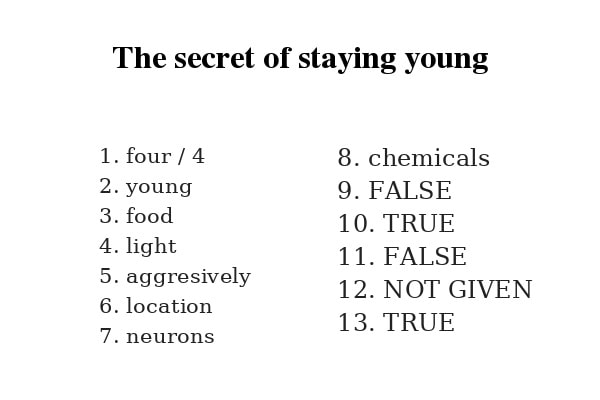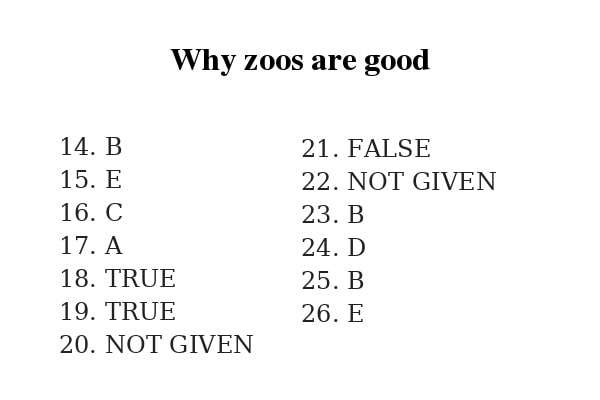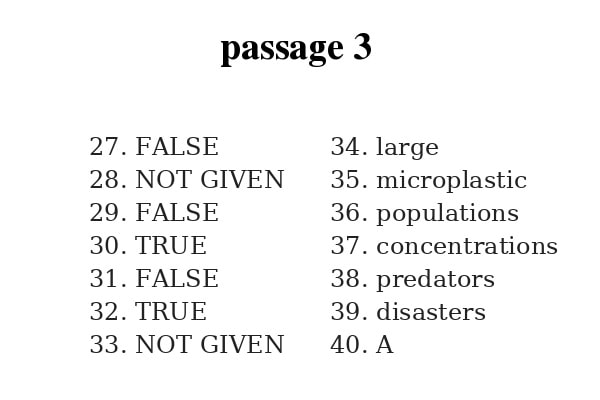Into the Wild Reading Questions Answer Key Packet
Cambridge IELTS 14 is the latest IELTS exam preparation. READINGIELTS.COM will aid you lot to respond all questions incambridge ielts 14 reading test fourwith detail explanations.
Passage 1: The clandestine of staying immature
Questions ane-8: Complete the notes beneath.
1. Reply: four / 4
Explain
– Key words: focused historic period groups, ants
– In paragraph 3, it is stated that "Giraldo focused on ants at 4 age ranges",
so the answer must exist "four/4".
2. Answer: young
Explicate
– Key words: how well, ants, looked after
– The first sentence of paragraph 4 states that "Giraldo watched how well the ants took care of the immature of the colony"
– Look after = take care of
3. Respond: food
Explain
– Key words: power, locate, scent trail
– In the second sentence of paragraph iv, the author mentions how ants "followed the telltale odour that the insects unremarkably leave to marker a trail to food". This ways that she studied ants‟ power to locate food using a scent trail.
iv. Answer: calorie-free
Explain
- Key words: effect
- In the same paragraph, we are told that "she tested how ants responded tolight", pregnant that she tested the effect of "light" on ants
5. Answer: aggresively
Explain
– Key words: attacked, prey
– Still in paragraph four, Giraldo compared the way one-time and young ants attacked their casualty and found that the one-time ones attacked "just as aggressively" every bit the young ones did. In other words, she studied how aggressively they attacked the prey.
six. Respond: location
Explain
– Fundamental words: comparison, age, dying, cells, brains
– In paragraph 5, we know that Giraldo didn‟t discover any major departure in age and the location of dying brain cells betwixt xx-day-old and 95-twenty-four hours-old ants. This suggests that she compared between the age and location of dying cells.
7. Respond: neurons
Explain
– Key words: synaptic, complexes, brain‟due south, mushroom bodies
– In paragraph 5, it is stated that synaptic complexes are "regions where
neurons come up together"
8. Answer: chemicals
Explain
– Cardinal words: two, brain, associated, ageing
– Notwithstanding in paragraph 5, nosotros are told that Giraldo studied the level of serotonin and dopamine, which are ii "brain chemicals whose pass up often coincides with aging". This implies that they are associated with aging. Thus, the reply is "chemicals".
Questions 9-13: Practise the post-obit statements concord with the information given in Reading Passage 1?
9. Answer: Imitation
Explain
– Cardinal words: Pheidole dentata remain, active, whole, life
– In paragraph 2, the author mentions naked mole rats as an historic period-defying
animal: they stay fit for nearly their entire lives and they can reproduce even when old. It can be said that they remain agile for almost their whole life. Thus, Pheidole dentata ants are non the only animal with this feature.
10. Answer: Truthful
Explicate
– Key words: Ysabel Giraldo, starting time, Pheidole dentata precise, data, age
– It is stated in paragraph 3: "Unlike all previous studies, which but estimated how quondam the ants were…she knew their exact ages". This means that she was the first person to use the ants‟ exact ages in her studies.
11. Answer: FALSE
Explain
– Primal words: ants, Giraldo‟southward experiments, behaved, predicted
– It is stated in paragraph 4 that "Giraldo expected the older ants to perform
poorly…but the elderly ants were all good caretakers and trail-followers". This implies that the elderly ants behaved differently from what she expected (predicted). She thought that they would perform desperately, but they performed well.
12. Answer: NOT GIVEN
Explain
– Cardinal words: contempo, studies, bees, different, methods, measuring, age-related decline
– With regard to recent studies of bees, the author only mentions in paragraph vi that the results about age-related pass up were mixed: some showed it while some didn‟t. However, there is nothing said near the methods used, Then this statement is Non GIVEN.
xiii. Respond: True
Explain
– Central words: Pheidole dentata laboratory, live, longer
– The kickoff sentence of paragraph 3 reveals that in the lab, Pheidole dentata
ants typically live for around 140 days. Later, in paragraph 7, it is said that
"out in the wild, the ants probably don‟t live for a full 140 days". This clearly ways that the ants tend to alive longer in laboratory conditions.
– The statement is therefore TRUE.

Passage 2: Why zoos are good
Questions 14-17: Reading Passage 2 has half-dozen paragraphs, A-F.
14. Reply: B
Explain
– Key words: speedily, animal, species, die out
– Information technology is mentioned in paragraph B that "some of these collapses have been
sudden, dramatic and unexpected", with "these collapses" referring to the
extinction of animals. The discussion "sudden" is a synonym for quickly, so the
sentence suggests that some animals may get extinct, or die out, speedily.
15. Respond: E
Explain
– Key words: preferable, report, animals, captivity, wild
– The term „animals in captivity‟ is another way of saying „animals in zoos‟. The role of zoos in animal inquiry is mentioned in paragraph Due east: "Being able to undertake inquiry on animals in zoos where there is less risk and fewer variables means real changes can be effected on wild populations". And then, zoos have many advantages for studying how animals live, human action and react. Thus, – The answer is paragraph E.
16. Reply: C
Explain
– Key words: two, ways, learning, animals, other than, zoos
– Several ways of learning nearly animals are mentioned in paragraph C: zoos, goggle box documentaries, and museums. Thus, this paragraph shows two ways of learning about animals other than visiting them in zoos.
17. Answer: A
Explicate
– Central words: animals, zoos, healthier, wild
– The first sentence of the passage is: "it is perfectly possible for many species of animals living in zoos or wildlife parks to have a quality of life equally high every bit, or higher than, in the wild". Higher quality of life implies that zoo animals may exist healthier than those in the wild. The writer then goes on to discuss various reasons why zoos are healthy places for animals, including a skilful diet, treatment of illnesses and a safe environment from predators.
Questions eighteen-22: Exercise the following statements agree with the information given in Reading Passage 2?
xviii. Reply: TRUE
Explain
– Key words: animal, live, longer, zoo
– As we know from question 17, the comparing between animals living in zoos and in the wild is in paragraph A. "The boilerplate captive beast volition have a greater life expectancy compared with its wild counterpart". The captive animate being refers to animals in zoos. Its wild counterpart refers to animals of the aforementioned species in the wild.
19. Respond: TRUE
Explain
– Key words: species, zoos, no longer, found, wild
– It is stated in paragraph B that "A proficient number of species just be in
captivity", implying that these species cannot be found in the wild.
– The statement is Truthful.
twenty. Answer: Non GIVEN
Explain
– Central words: improvements, TV, wildlife, documentaries, increased, numbers, zoo visitors
– With regard to TV documentaries, the writer simply mentions (in paragraph C) that "tv set documentaries are becoming ever more than detailed and
impressive" just at that place is no relation between this and zoo visitor numbers.
– This information is NOT GIVEN.
21. Answer: FALSE
Explain
– Primal words: zoos, excelled, information, animals, public
– Paragraph D states that zoos can "communicate information to visitors most the animals they are seeing and their place in the earth". In other words, zoos can transmit information about animals to the public. It is mentioned, however, that "this was an area where zoos used to exist lacking", implying that zoos were not practiced at this in the by.
– The statement is therefore FALSE.
22. Answer: NOT GIVEN
Explain
– Key words: studying, animals, zoos, less, stressful, the wild
– In comparison with studying animals in the wild, studying them in zoos is less risky and involves fewer variables. We simply know that at that place is less chance for both the animals and the scientists themselves, but nosotros do not know if
studying animals in zoos is less stressful. There is no information regarding
this.
Questions 23-24: Cull TWO letters, A-Due east.
23-24. Answer: B. Some travel to overseas locations to join teams in zoos., D. Some teach people who are involved with conservation projects
Explain
– Cardinal words: ii, stated, zoo staff
– Information technology is stated in paragraph D that:
– "Many zoos also piece of work directly to educate conservation workers in other
countries" -> zoo staff can teach conservation workers, or people involved
with conservation projects. And so D is right
Teach = educate
– "..or send their animal keepers abroad to contribute their cognition and skills to those working in zoos and reserves". This means that some animal keepers (a type of zoo staff) travel to overseas to help other zoo staff.
– So B is correct
Questions 25-26: Choose Two letters, A-E.
25-26. Reply: B. They can increase public awareness of environmental problems., Eastward. They tin raise animals which can later be released into the wild.
Explain
– Key words: two, beliefs, zoos
– In paragraph B, it is stated that some animals have been reintroduced into the wild from zoos, or that wild populations have been increased past the
introduction of captive bred animals. The term „reintroduce‟ means that
animals will be raised in zoos before existence released into the wild.
– So Eastward is correct.
– Public = general population
– Sensation = conscious
– Thus, the sentence can exist paraphrased into: zoos tin increase public
awareness of ecology bug.
– B is correct.

Passage 3: ielts 14 reading test 4 passage three
Questions 27-33: Do the following statements agree with the information given in Reading Passage three?
27. Answer: Simulated
Explain
– Fundamental words: Rochman, colleagues, first, research, marine, debris
– Paragraph 2 mentions that "plenty of studies have sounded alarm bells about the land of marine debris" and that "Rochman and her colleagues fix out to determine how many of those perceived risks are real". This implies that there has been other research on marine debris before Rochman and her colleagues, and they desire to examine these previous studies.
– Thus, the argument is Fake.
28. Answer: Not GIVEN
Explain
– Key words: creatures, danger, sea, trash, seabirds
– Paragraph iii but mentions that "certain seabirds eat plastic bags" just nosotros exercise not discover any data about them being the most in danger. Scientists have just „speculated‟ about wider effects: „There wasn‟t a lot of information‟.
– Thus information technology is Not GIVEN.
29. Answer: FALSE
Explain
– Primal words: studies, Rochman, reviewed, proved, some birds, extinct
– Rochman gave an imaginary case in paragraph iii of a study which might testify certain birds eating plastic, and and then warn that those birds are "at take a chance of dying out". Only this, as well as many other perceived threats, had not yet been tested, co-ordinate to Rochman. In other words, there is no proof that the birds will soon become extinct.
– The statement is therefore FALSE.
30. Respond: Truthful
Explain
– Key words: Rochman, analysed, papers, danger, ocean trash
– Paragraph 4 states that "Rochman and her colleagues examined more than than a hundred papers on the impacts of marine debris" and found 366 perceived threats. It can exist understood that these papers focused on various kinds of danger (threat) caused by ocean trash (marine debris).
31. Answer: Simulated
Explain
– Key words: almost, research, analysed, Rochman, badly, designed
– In paragraph v, the writer states that "In 83 percentage of cases, the perceived dangers of sea trash were proven true". So, in that location is obviously no reason to recall that this enquiry was badly designed if the findings were proven true, "In the remaining cases, the working group establish the studies had weaknesses in pattern". Therefore, merely 17 percent of the cases analysed were badly designed. So, most of the cases were well designed.
– The argument is FALSE.
32. Answer: Truthful
Explain
– Primal words: i, study, expecting, mussels, harmed, eating, plastic
– The information about mussels (a type of shellfish) tin can exist plant in paragraph six The study examined mussels that consume plastic, "but it didn‟t seem to stress out the shellfish". This means that the plastic didn‟t seem to have whatever harmful effect on the mussels. Rochman said this report "failed to find the effect information technology was looking for", so clearly information technology was looking for some effect of the plastic on the mussels.
33. Respond: NOT GIVEN
Explicate
– Central words: some, mussels, choose, eat, plastic, preference, natural, diet
– Paragraph 7 merely states that the "mussels may be fine eating trash". Information technology does not mean they adopt trash to their natural nutrition.
– The statement is Non GIVEN.
Questions 34-39: Complete the notes beneath.
34. Answer: large
Explicate
– Key words: bits, debris, harmful, animals
– Rochman institute (paragraph 8) that "most of the dangers besides involved large pieces of droppings" that can cause severe injuries to animals.
– So the answer is "large".
35. Answer: microplastic
Explain
– Key words: little, research, constructed fibres
– Paragraph nine mentions that "Rochman‟south grouping found little research on the
effects of these tiny bits", with "tiny $.25" referring to microplastic.
– And so the answer is "microplastic".
36. Answer: populations
Explain
– Cardinal words: most, focused individual, not, entire
– The remaining questions refer to the drawbacks of the studies. According to paragraph 10: "Many studies have looked at how plastic affects an individual animal…rather than the whole populations".
37. Answer: concentrations
Explain
– Cardinal words: plastic, lab, not, reverberate, body of water
– It is mentioned in paragraph 10 that "in the lab, scientists ofttimes employ higher
concentrations of plastic than what‟due south really in the ocean". This means that the concentrations of plastic used in the lab was different from, and thus did not always correctly reverberate, those in the body of water.
38. Answer: predators
Explain
– Key words: bear on, reduction, numbers, species
– Rochman said in paragraph 10 that no one can tell the states "how deaths in one
species could touch on that animate being‟s predators". Deaths in one species can be
understood as a reduction in numbers of that species.
– Impact = effect (affect)
– Thus, there is insufficient data on how a reduction in numbers of a species can impact on their predators. The bare should be filled with
"predators".
39. Respond: disasters
Explain
– Key words: more than, information, needed, impact, future, oil
– According to Rochman in paragraph11, we need to inquire more "ecologically
relevant questions", such equally how disasters will touch the environment before they actually happen. This means that more information related to disasters is needed. She as well mentioned an oil spill as an example of the impact of future disasters which we need to know more nearly, by asking the right questions before. Hence,
– The respond is "disasters".
Questions 40: Choose the right letter of the alphabet, A, B, C or D
40. Answer: A. Assessing the threat of marine debris
Explicate
– The passage does non focus on who is to blame for marine debris, nor does it focus on whatever new solutions or international action, which are only briefly
referred to in paragraph 12. In the final paragraph, Rochman refers to the
importance of "clearing up…misconceptions" in order to know how serious the threat of marine droppings actually is. Therefore, it is important to interrogate "the existing scientific literature" to aid ecologists to effigy out "which problems really need addressing".
– The entire passage concerns Rochman and her study on other prior enquiry on marine debris. She assessed these studies to reply the question of whether the state of affairs is every bit bad as they suggested. In other words, Rochman assessed the threat of marine droppings mentioned by other researchers.
– A is the correct answer.
– Assess = figure out

Cambridge ielts 1-16 reading test solutions
Cambridge IELTS Reading KEYWORDS Table
IELTS Reading Do Test
IELTS 14 Academic Student's Book with Answers with Audio
IELTS 14 General Training Student'southward Book with Answers with Audio
Source: https://www.readingielts.com/cambridge-ielts-14-reading-test-4-answers/
0 Response to "Into the Wild Reading Questions Answer Key Packet"
Post a Comment